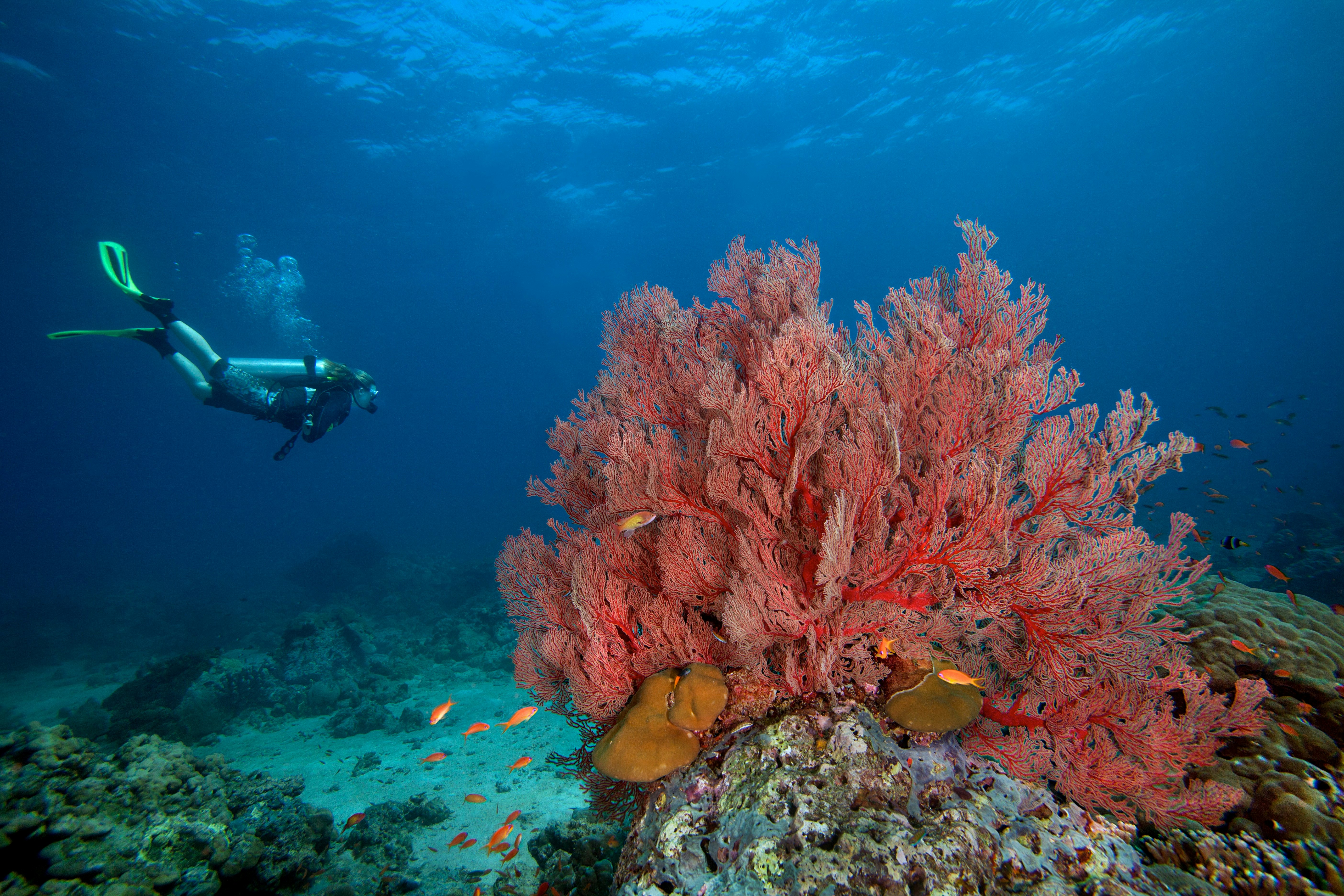Wine, wilderness and white-water: exploring the adventurous side of Tuscany
Nov 20, 2017 • 6 min read

Tuscany is ideal for cyclists. Umomos / Shutterstock
The Italian region of Tuscany is rightly famous for its outstanding history, culture, wine and cuisine. But there's another side to the region waiting to be explored. Tuscany's varied and exciting landscapes make it a perfect destination for those in search of an active holiday, with a huge variety of adventures on offer, ranging from cycling and horse riding to canyoning and scuba diving.
Cycling in the winelands of Central Tuscany
The rolling hills and winelands of Central Tuscany are the classic Tuscan landscape, made familiar by their prominent inclusion in everything from Renaissance paintings to tourist brochures. The beautiful scenery here is exceptional in its variety, a patchwork of vineyards, olive groves, golden fields of wheat and verdant pastureland. The perfect way to roam through this landscape is on a bicycle, feeling the warm sun on your shoulders and breathing in the delicate scents on the fresh breeze as it whisks through your hair.
Tuscan topology is satisfyingly challenging on a bicycle but not excessively so, passing through gently undulating hills, and ramping up to tougher climbs to reach picturesque hill towns before providing stunning views as you coast back down again. Every moment the vista changes, from distant farmhouses flanked by cypress trees, to the geometric lines of fruitful grape vines. This is also the perfect area if you want to combine healthy exercise with a dose of gastronomic indulgence, or vice versa, as there are plenty of delicious wines and other culinary specialities to try along the way, though for most wine tastings you will need to book in advance rather than just turning up at the cellar door.
If the mere mention of hills has you worried, or your group is of mixed cycling abilities, you’ll be pleased to hear that e-bikes are readily available for rent. These frankly magical contraptions take the sweat out of cycling, so that climbing up a challenging hill is just as easy as coasting along on the flat. In many cases it’s possible to steer clear of traffic by sticking to the strade bianche, a network of old unsealed backroads named after the white limestone dust and gravel from which they are formed.
Canyon adventures in the Garfagnana
In the far northwest of Tuscany the densely forested valleys of the Garfagnana have a remote and secluded feel, tucked away between the Apuan Alps in the west and the Apennine mountains in the east. Many of the trees are sweet chestnut, and the region is famed for its chestnut flour, which is used to make delicious pastas and breads. The river Serchio and its tributaries run through the mountainous region, creating a network of dramatic canyons – the perfect playground for adventure seekers.

Canyoning in the Rio Selvano is an exciting and invigorating way to get up close and personal with nature, following the cool clear waters of a mountain stream down a narrow steep-sided gorge, surrounded by lush vegetation. It’s not for the faint of heart, as you’ll be sliding down slippery rock chutes, hurling yourself into deep plunge pools and abseiling down the face of huge waterfalls. But you’re in the safe hands of Simone Cecchi, president of the Italian Association of Canyoning Guides, who is a reassuring and comforting presence when the going gets tough.
The nearby Lima river is deeper, with some exciting rapids that are ideal for white-water rafting and kayaking. If you want to get your pulse racing without getting wet, Canyon Park in the upper Lima Valley is Italy’s first high ropes course within a canyon. Here you’ll hurtle down zip lines and tightrope walk across high-wire bridges, with just a wire a couple of centimetres wide between you and the glittering turquoise water of the Lima river more than 100 metres below. It’s completely safe thanks to an innovative safety system that keeps you harnessed in at all times, so the activity is suitable for kids as young as 10, provided they have a head for heights!
Horse riding in the Maremma
The southern Maremma region has a mythical place in the Tuscan psyche, known as a land of remote, unyielding landscapes and tough, independent people. The Parco Regionale della Maremma has a unique variety of landscapes, with the squat, wooded Uccellina hills running parallel to the long pristine beaches of the coast. In stark contrast to the majority of Italy’s overdeveloped beaches, the Marina di Alberese’s 8km of fine, golden sand are refreshingly untouched, strewn with bleached driftwood rather than close packed with loungers and beach umbrellas. The air is pleasantly scented by the forests of stone-pine trees that frame the edge of the beach.

Since ancient times humans have been trying to tame this territory. Malarial swampland that claimed the lives of many (including the painter Caravaggio) was drained to create a rugged cattle-rearing country that became home to tough Tuscan cowboys, known as the butteri, as well as their long-horned grey Maremmana cattle and muscular Maremmano horses. Though they have died out elsewhere the butteri’s proud traditions are alive and well in the regional park, where they still ride out in their traditional costumes with their forked mazzarella sticks to round up the herds.
With its equestrian traditions and stunning scenery, the Maremma is an ideal location for a horse-riding holiday or excursion, though due to the challenging terrain most operators require their clients to have enough experience on a horse to trot comfortably and ride up and downhill.
Diving in the Tuscan Archipelago
Most visitors to Tuscany don’t realise that the region is home to one of Europe’s largest marine parks – the Tuscan Archipelago National Park, which covers the seven islands of the Tuscan Archipelago and hundreds of square kilometres of the Mediterranean sea around them. The largest and most famous island is Elba, where Napoleon was exiled for 300 days. Its beautiful sandy beaches make it a popular summer getaway destination, and it is also a great destination for hikers and cyclists, but to really experience the glories of the marine park you need to get under the sea.

The diving here is known for its crystal clear water, vibrant marine life and intriguing wrecks. Many dive sites feature yellow and red gorgonian fans of up to one metre in diameter and at some sites you can see rare red coral, which has been depleted in the Mediterranean due to harvesting for jewellery. There are plenty of colourful fish to see, including grouper, snapper, barracuda and moray eels, as well as more unusual sea life such as seahorses, lobsters, octopus and spotted eagle rays (which are most often seen near the island of Pianosa). There are also occasional sightings of dolphins, turtles and 2-metre-long sunfish. The main season is between June and September, and there are many dive operators based in or near Portoferraio on the north coast of Elba.
Anna Tyler travelled to Tuscany with support from Toscana Promozione Turistica and the Adventure Travel Trade Association. Lonely Planet contributors do not accept freebies in exchange for positive coverage.
Plan with a local




